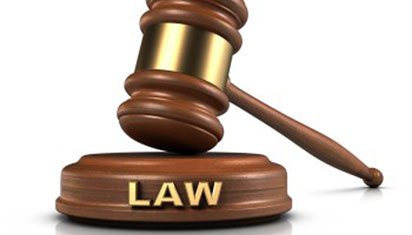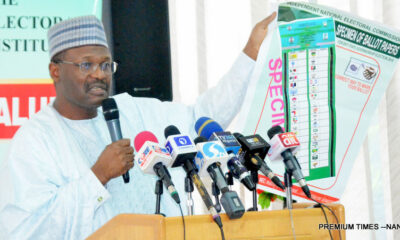Latest News
Court to open hearing on N50b suit against INEC, two others

A Federal High Court in Abuja has scheduled hearing for May 27 this year in a suit seeking to among others, bar the Independent National Electoral Commission (INEC) from further use of transparent ballot boxes, permanent voters’ card and related devices for elections.
The suit, filed by a firm – Bedding Holdings Limited – is intended, among others to enforce two pending judgments given by the Federal High Court on June 5, 2012 and January 28, 2014 which affirmed the firm’s exclusive patent rights over some inventions that formed the core of INEC’s electoral operations.
Bedding identified the inventions on which it has patent rights to include: “the Transparent Ballot Boxes (TBB), Electronic Collapsible Transparent Ballot Boxes (ECI’BB), Direct Data Capturing Machines, Electronic Card Reader (ECR), its derivable Permanent Voters’ Card (PVC) and Proof of Address System Scheme (PASS) Embedded with the Concept of the Coded Metal Plate and the Process and Application of these products to produce the Voters’ Register respectively.
The suit, marked: FHC/ABJ/CS/1537/2018, has Bedding listed as the sole applicant, with INEC, the Attorney General of the Federation (AGF) and the Registrar of Patents, Federal Ministry of Commerce and Industry, listed as respondents.
The applicant wants an order, compelling the respondents to abide by the judgment of the court delivered on June 5, 2012 in a suit marked: FHC/ABJ/CS/82/2011 and on January 28, 2014 in suit: FHC/ABJ/CS/816/2010.
Bedding is also praying praying the court for an order, directing the respondents to pay it N50billion “as exemplary damages for the continued use of the Transparent Ballot Boxes, Electronic Collapsible Transparent Ballot Boxes and Direct Data Capturing Machines for the registration of voters and or the collation/compilation and production of the voters’ register” without its prior and express consent.
It equally seeks an order of perpetual injunction, restraining the respondents from using its inventions and anything derived thereof, without the prior and express consent, and “to declare any action or actions whatsoever and however or purported to have been taken in connection thereto, as illegal, unlawful, unconstitutional, null and null.
On December 18, 2018, Justice Nnamdi Dimgba (also of the Federal High Court, Abuja) restored the judgment given by Justice Adamu Bello on July 5, 2012 and gave Bedding the permission to commence the process of enforcing the judgment.
In a supporting affidavit, deposed to by its Chief Executive Officer (CEO), Sylvester Odigie, Beddings claimed that the respondents have continued to disregard the judgment of June 5, 2012 and a subsequent one of January 28, 2014 which further confirmed its (the firm’s) exclusive patent rights over the said inventions.
Bedding stated that its core speciality is in the fabrication and manufacture of steel metal products such as transparent ballot boxes, electronic transparent boxes, among other products.















